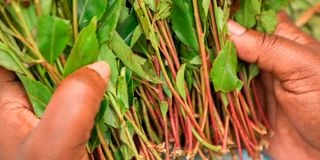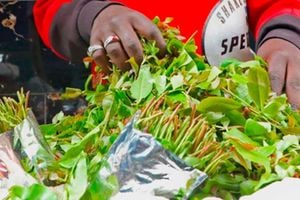
A bundle of miraa on display at Argyle Grand Hotel Nairobi during the forum on the Narcotic Drugs and Psychotropic Substance Control Amendments Bill, 2024 on May 24, 2024.
At the crack of dawn, 13-year-old Kevin Mutethia (not his real name) joins groups of men into miraa farms in Igembe South, where he harvests the stimulant and helps in packaging it for the market.
Earning a daily wage of between Sh500 and Sh1,000, Mutethia has been in this trade for the past three years and has never seen the door of a classroom since then and does not hope to, at least for now.
The children start working in miraa farms from the age of 10 and with pickers paid between Sh70 and Sh250 per bundle depending on the variety of khat, one can make up to Sh1,000 per day.
But children experience bullying, exploitation and are at times paid less than adults.
Mutethia is among thousands of children under the age of 18 who are working in miraa growing areas, with elders and local leaders raising alarm over high prevalence of child labour in the miraa subsector.
According to data collated by the Njuri Ncheke Council through local leadership, more than 30,000 children from Igembe North, Igembe Central and Igembe South are out of school.
Data from the 2019 Census indicated that Meru County had the highest percentage of primary school dropouts in the country at 18 per cent.
Mr Peter Ntoitha, a Njuri Ncheke elder said the council also intends to enforce a ban on miraa chewing for children under the age of 18.
"As elders, we have noted that the issue of school dropout in Igembe region has gone out of hand. We have agreed with the police and chiefs to scour miraa farms and towns for children who are out of school. We must rescue our young generation," Mr Ntoitha said.
Njuri Ncheke branch Secretary in Igembe South Fredrick Limiri said they had established that parents were increasingly abandoning their responsibilities forcing children into work.
"When parents fail to meet the needs of their children, they end up seeking employment to cater for their needs. This is how many of them end up in miraa picking jobs," Mr Limiri said.
According to Jennifer Kathure, a child protection volunteer, miraa dealers prefer children for cheap labour.
"In miraa picking, children are also preferred because they are light and may not damage the miraa trees during picking. The dealers can also transport as many pickers as possible in a small vehicle," Kathure said.
Mr Joseph Mutia, the programme coordinator at Kangaroo Community Care Kenya, an organisation that rehabilitates working children, says boys who work in miraa farms also end up in boda boda business.
“Since Miraa picking and packaging is done for a few hours, the boys spend the rest of the time in boda boda business,” Mr Mutia said.
He said high cases of teenage pregnancies in the region have been blamed on boda boda riders. Parental negligence, lack of mentors and role models are also cited for the poor school retention.
Zoe Empowers Chief programme officer Reagan Kaberia says most children lack moral support to pursue education.
“What we lack is clear interest in education because there are no role models. Dropouts can venture in miraa business and do well. When those in school see successful miraa traders, it affects their interest in education. We need serious mentorship of pupils to retain them in school,” Mr Kaberia said.
Mr Ntoitha said small cars such as Probox ferry up to 30 miraa pickers while lorries carry more than 100 people.
In January last year, four people died after a Land Rover ferrying 40 miraa pickers overturned.
Ms Kathure said besides child labour, the children also live in squalid conditions.
"The children live in very bad conditions because there is no proper housing. The children involved in miraa picking are ferried from far villages," she said.
The outcry has now attracted civil society organisations, administration officers and the police who have vowed to launch a crackdown on child labour from January next year.
"Police officers will be inspecting vehicles ferrying miraa vehicles and arrest anyone found transporting children. Traders in miraa business should not use their vehicles to ferry children. You must ensure every miraa picker has an ID," Igembe South Police Commander Eliakim Silgich said.
Igembe Development Organisation secretary Murithi Kimencu said they rallied various stakeholders after discovering child labour had gone out of hand.
"We are calling on the police, administrators, politicians, elders and miraa dealers to work together in fighting child labour and school dropouts. We have agreed to enhance enforcement of the children act to ensure all children in Igembe go back to school," Mr Kimencu said.
He said an operation to have children go back to school will kick off in earnest next year.






